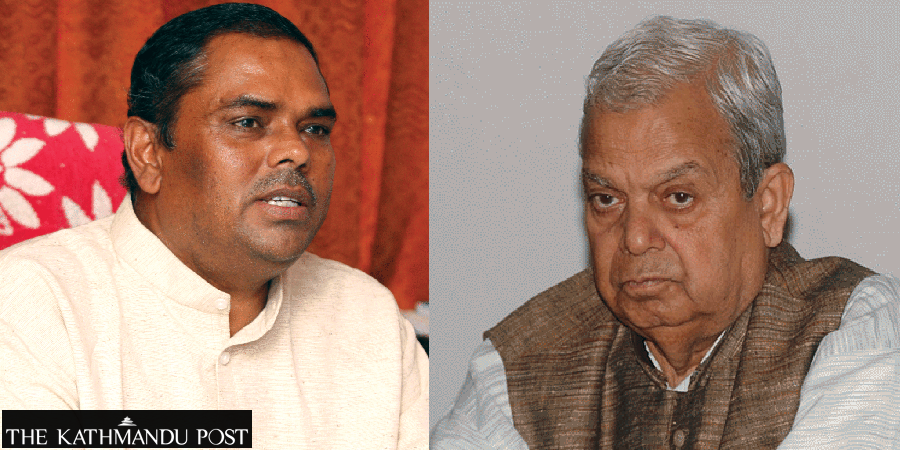Politics
As nomination day nears, key partner quits ruling alliance
Unhappy with coalition’s offer, Janata Samajbadi reaches out to Oli. Loktantrik Samajbadi jumps in to fill the void.
Purushottam Poudel
The five-party alliance led by the Nepali Congress, which was formed to topple the government led by CPN-UML chair KP Sharma Oli, is on the verge of disintegration due to their failure to agree on the sharing of seats for the upcoming federal and provincial elections scheduled for November 20.
After 14 months of partnership, a member, the Janata Samajbadi Party (JSP), is set to sever its ties with the alliance as it started serious negotiations to ally with the CPN-UML.
JSP leaders led by party chair Upendra Yadav on Friday skipped a meeting of the ruling alliance at Baluwatar to visit UML leaders including party chair Oli at the latter’s residence in Balkot, Bhaktapur.
Yadav turned his back on the alliance after failing to secure enough seats for his party following weeks-long negotiations, and reached out to the UML hoping for a better bargain.
With the JSP’s exit from the five-party alliance, another Madhes-based party Loktantrik Samajbadi Party (LSP) has started negotiations with the coalition.
LSP leaders including Sarat Singh Bhandari, Anil Jha, and Jitendra Sonal sat with the ruling coalition on Friday at Baluwatar.
“We had a meeting with the ruling coalition today, but there is nothing substantial to share with the media,” Sonal, an LSP leader, told the Post.
The party has not yet disclosed how many seats it has demanded with the ruling coalition.
“We are unable to share the details of the meeting at this point,” Laxman Lal Karna, another LSP leader, said.
However, an LSP insider privy to the development said his party would join the alliance if it is allocated 13 seats. According to the leader, the LSP has claimed 16 seats and the chief minister’s post in the Madhesh Province.
Earlier, on September 23, the LSP had formed a six-member team to discuss electoral partnership with the CPN-UML. But soon after the JSP started negotiations with the UML, the LSP began negotiations with the ruling camp.
For the past two months, the ruling coalition is engaged in intense negotiations to share the seats for the November 20 elections. Although the JSP had demanded 32 of the 165 first-past-the-post seats of federal parliament, it later hinted that it would settle for 25 seats. But after sensing that they would not be allocated more than 16 seats, JSP leaders said they began looking for an alternative strategy—negotiations with the CPN-UML.
On Thursday evening, JSP chair Upendra Yadav had left the alliance meeting early to meet UML chair Oli.
However, JSP has so far not officially announced its exit from the five-party alliance.
Leaders of the ruling alliance had been claiming that their seat-sharing talks had been progressing positively. According to multiple leaders involved in the inter-party negotiations in the ruling alliance, all was going well until Congress leader and the coordinator of the task force, Krishna Prasad Sitaula, brought a new proposal on seat distribution that spoiled the atmosphere of consensus.
“With Situala’s new proposal, which was more favorable to Congress, the agreement which was left out to be inked got deteriorated,” JSP spokesman Manish Kumar Suman told the Post.
At the meeting of coalition partners held on September 30, Situala had proposed a new seat-sharing formula which JSP had rejected. But the CPN (Maoist Centre) had supported Sitaula’s new proposal.
From the start, the Congress and the JSP had their own claims with regard to the 32 seats of the Madhesh province.
The Election Commission has set October 9 as the deadline for registering candidates for the House of Representatives and provincial assemblies. Prior to that, the parties will need to nominate candidates and the alliance will need to distribute the electoral constituencies among themselves.
A leader of the alliance said the parties are now working to share the seats set aside for the JSP among member parties following the Madhes-based party’s decision to quit the alliance.
“Negotiations are underway to divide the seats the JSP had previously claimed, among alliance members,” a leader from the ruling coalition told the Post.




 8.22°C Kathmandu
8.22°C Kathmandu















